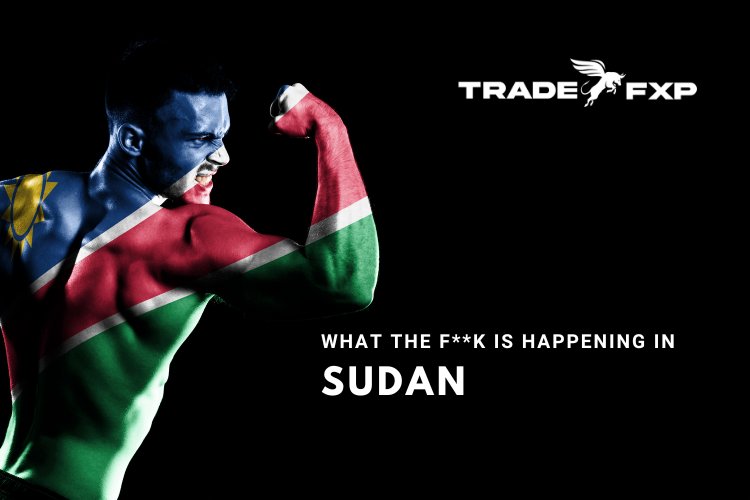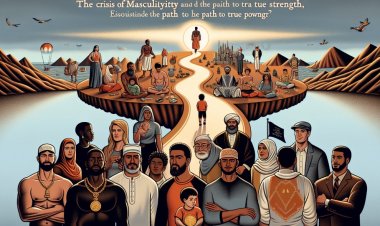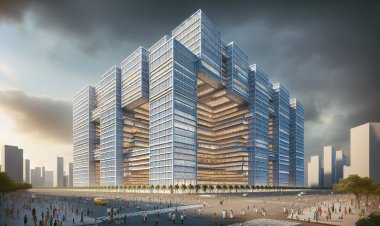Unveiling the Unrest: Decoding the Current Events in Sudan | TradeFXP Blogs
Explore the latest developments and unravel the complexities of the situation in Sudan. Stay informed with insightful analysis and updates on the ongoing events. TradeFXP's comprehensive coverage sheds light on what's happening in Sudan.

What on earth is happening in Sudan?
In simple terms, greedy, stupid, idiotic, power and money hungry jackasses (SOBs).
Sudan Political Crisis: Understanding the Conflict Between Tagalo and Burhan
Sudan has been racked by violence and conflict for many years, with differences in religion, ethnicity, economics, and politics between the North and South of the country being the root of many issues. This conflict has led to ongoing violence, even after South Sudan gained its independence from Sudan in 2011. The city of Khartoum and surrounding areas have been particularly affected by violence, with Sudan's Army Chief, General Abidal Fateh al-Burhan, and his second-in-command, Deputy General Muhammad Hamdan Dagalo, battling for power in Sudan.
The Historical Root of Sudan's Conflict
Sudan has a long history of conflict rooted in differences in religion, ethnicity, economics, and politics. These differences were most pronounced between the North and South of the country and were the primary cause of the Sudanese civil war, which lasted from 1955 to 1972 and resumed in 1983 until the Comprehensive Peace Agreement was signed in 2005. However, conflict within the North of the country between different groups of elites, who have dominated the political landscape, has also been responsible for violence and instability.
The ruling elites of Sudan have long been divided among ethnic and regional lines. This division is most pronounced between the riverine elites, who live along the Nile and control the central government, and the marginalized populations in the periphery. The elites in Khartoum are mostly Arab and Muslim, while those in the periphery are non-Arab and non-Muslim. This division has been the root cause of many of the conflicts in the region, including the Darfur conflict and the current political crisis.
The Sudanese government has historically treated the periphery as a source of cheap labor and raw material for the extraction of natural resources, leading to resentment and conflict. The marginalized people in the periphery, including those in Darfur, South Kordofan, and the Blue Nile, have long felt oppressed and excluded from the political process. These regions have also been disproportionately affected by natural disasters and climate change, leading to further marginalization and poverty.
Another factor contributing to Sudan's political crisis is the spread of Islamic fundamentalism, which gained traction during the 1980s and 1990s under the leadership of Omar al-Bashir. The National Islamic Front (NIF), the Islamist party in Sudan, attempted to impose Sharia law, leading to conflicts with other religious groups and further marginalization of non-Arabs and non-Muslims.
The roots of the current political crisis in Sudan can be traced to the ousting of long-time dictator Omar al-Bashir in April 2019. His removal was the culmination of months of protest by Sudanese civilians who were fed up with his corrupt regime. In the aftermath, the military and the civilian opposition agreed to a power-sharing agreement that established the Transitional Sovereign Council (TSC) to oversee the transition to democracy.
However, in October 2021, General Burhan, the head of the TSC, orchestrated a coup against the civilian members of the council, locking up their leaders and consolidating power. His deputy, General Tagalo, who had been instrumental in ousting Al-Fashir, became his chief rival, and tensions between the two generals escalated.
In conclusion, Sudan's current political crisis has its roots in a long-standing conflict between the central government and the marginalized populations in the periphery. This division has been exploited by the elites in power, creating a vicious cycle of violence and instability. The spread of Islamic fundamentalism and the ousting of Omar al-Bashir further destabilized the region and led to the current power struggle between General Burhan and General Tagalo. While international mediation may eventually lead to a resolution, the ultimate fate of Sudan rests on the outcome of the fight between these two generals.
The 2019 Presidency of General Abidal Fateh Al-Burhan
One of the main players in Sudan's current political crisis is General Abidal Fateh al-Burhan, who became president in 2019. His presidency was characterized by attempts to make the government appear more democratic and by cultivating closer ties with the United States and Israel. However, his presidency was cut short by the 2021 coup, which has thrown Sudan into chaos.
General Burhan is a former army officer who had previously served as the head of Sudan's security and intelligence services. He was appointed as head of the military junta that took power following the ouster of former President Omar al-Bashir in 2019. The junta's role was to oversee a transition period leading to democratic elections, but it was criticized for its lack of progress toward this goal.
During his presidency, General Burhan worked to build better relations with the United States and Israel. In late 2020, the United States removed Sudan from its state sponsors of terrorism list, clearing the way for Sudan to access international financial aid. In January 2021, Israel and Sudan announced that they would establish diplomatic relations, making Sudan the third Arab country to do so under the Trump administration.
Despite these efforts at international rehabilitation, General Burhan's government was criticized for continuing to commit human rights abuses, including the use of violence against protesters and harsh restrictions on the media. Doctors Without Borders reported in 2020 that there had been a sharp increase in the number of people suffering from gunshot wounds in Khartoum.
While the international community praised Sudan's efforts to transition to democracy, General Burhan's critics accused him of consolidating power and repressing political opponents. In response, Burhan argued that Sudan needed stability in the face of insecurity and economic instability.
The 2021 coup has thrown General Burhan's future into doubt. While he remains in power, he faces fierce opposition from General Dagalo and his supporters, who believe that they should have more say in Sudan's future. The international community has been quick to condemn the coup, with the US and UK calling for an immediate return to civilian rule.
General Burhan's future is uncertain, as is the fate of Sudan. The country is deeply divided along ethnic and religious lines, and the military has a long history of intervening in politics. The coup has raised fears that Sudan will slide back into the kind of authoritarianism that characterized Omar al-Bashir's regime.
For now, General Burhan remains in power, but he faces an uphill battle to maintain control over Sudan. The struggle for political dominance between General Burhan and General Dagalo is just one part of a larger conflict that will determine Sudan's future. The international community will have to play a delicate balancing act, as they try to support democracy while also grappling with the complex geopolitical interests at play in the country.
The Coup and Aftermath: The Power Struggle Between Tagalo and Burhan
The political crisis in Sudan has been looming for several years, with violence and conflict being commonplace. However, on October 25, 2021, the situation took a drastic turn for the worse when General Burhan and his deputy, Tagalo, orchestrated a coup against the civilian political parties within the Transitional Sovereign Council (TSC).
The coup was a surprise to many, given the supposed democratic principles behind the TSC's formation. The Sudanese people had hoped that the TSC would bring stability, end the civil war and lead to a more democratic government. However, the coup by Burhan and Tagalo has dashed these hopes and has resulted in civil unrest, displacement of thousands of people, and a severe humanitarian crisis.
Following the coup, the power struggle between Burhan and Tagalo intensified. The situation reached a boiling point when Burhan sought to reappoint individuals who were associated with the Omar al-Bashir regime, including Islamists. This move was not trusted by Tagalo and led to his defiance and the subsequent formation of an opposing faction.
The main point of contention between the two generals is the control of the Rapid Support Forces (RSF), which is Tagalo's main base of power. The RSF is a paramilitary organization with a history of human rights violations, including involvement in the Darfur conflict. The RSF has been instrumental in bringing down the regime of Omar al-Bashir and was a significant player in the post-coup power struggle.
Despite allegations of human rights violations, General Tagalo has been seeking to rebrand himself as a national figurehead who represents the marginalized. Tagalo has allied himself with rebel groups and has been pushing for power for some time now.
The situation in Sudan is complicated by international involvement. While the Western world has called for a ceasefire and peace talks, they have little leverage over the generals since Sudan has been largely isolated since the coup. In contrast, Russia has a strategic interest in Sudan and has been working to establish a naval base on the Sudanese coastline. Saudi Arabia and the UAE have also been involved, sending thousands of fighters to support the Saudi war in Yemen.
The situation is also attracting attention from other African nations with vested interests. Egypt, Ethiopia, and Eritrea have agendas that may align with the winning side in Sudan. There is a real threat that the outcome of the struggle between Burhan and Tagalo could have far-reaching implications not just within Sudan but also for the wider international community.
The United Nations and African Union are expected to mediate between the two generals. However, their success in resolving the crisis remains uncertain. Despite calls for peace talks, both Burhan and Tagalo are presenting their claims to the people, and the outcome of this struggle is likely to be decided on the ground in Sudan.
Ultimately, the coup has plunged Sudan into yet another round of violence and unrest. The fate of the country hangs in the balance, with the ongoing jostling for power between Tagalo and Burhan, keeping the future of the country uncertain.
International Involvement in Sudan's Political Crisis
Sudan's political crisis has been a cause of international concern, with major powers becoming involved in the attempts to resolve the conflict between General Burhan and General Tagalo. The United Nations and African Union have called for an immediate ceasefire to allow for dialogue between the two factions, but the situation remains tense.
Russia has a keen interest in Sudan due to its strategic location, with the Red Sea being a vital trade route. The coup by General Burhan and his military junta has further cemented Russian involvement, with Tagalo visiting Moscow in November 2021 to strengthen ties between Sudan and Russia. The visit resulted in a plan to establish a naval base on the Sudanese coastline, which is of great strategic importance to Russia.
However, Western powers remain wary of Russia's involvement in Sudan and fear that it may lead to the establishment of a military base on the Red Sea. The United States has been particularly vocal in calling for a peaceful resolution to the conflict, but its ability to intervene is limited due to Sudan's isolation from the international community since the coup.
Saudi Arabia and the United Arab Emirates (UAE) have close ties with General Tagalo and the Rapid Support Forces (RSF), sending thousands of fighters to support the Saudi-led war in Yemen. Both countries have vested interests in Sudan, particularly due to its proximity to the Red Sea and its potential for economic development. The RSF has been accused of human rights abuses, including the suppression of pro-democracy protests, and its close association with Tagalo has raised concerns about the direction Sudan may take if he emerges victorious.
Egypt, Ethiopia, and Eritrea have their interests in Sudan as well, particularly due to their shared borders with the country. Egypt is particularly keen to maintain its access to the Nile River, which provides water to its population and agricultural sector. Ethiopia has plans for the Nile River, including the construction of a massive dam, which has caused friction between the two countries. Eritrea has supported Sudan in the conflict by providing military assistance to General Tagalo, but its influence in the region is limited.
Despite international pressure, the conflict between General Burhan and General Tagalo shows no signs of abating. The fate of Sudan remains uncertain, with both sides presenting their claims to the people. A peaceful resolution is urgently needed to prevent further bloodshed and to allow for democratic processes to be reinstated. However, finding a solution will require a delicate balance between the interests of international powers and the desires of the Sudanese people.
To read more interesting articles CLICK HERE
Why do you need to be with TradeFxP? CLICK HERE
To join our Hunter AutoBot Trading Program CLICK HERE
All About TradeFxP's Hunter Ai EA Autobot CLICK HERE



 admin
admin 










